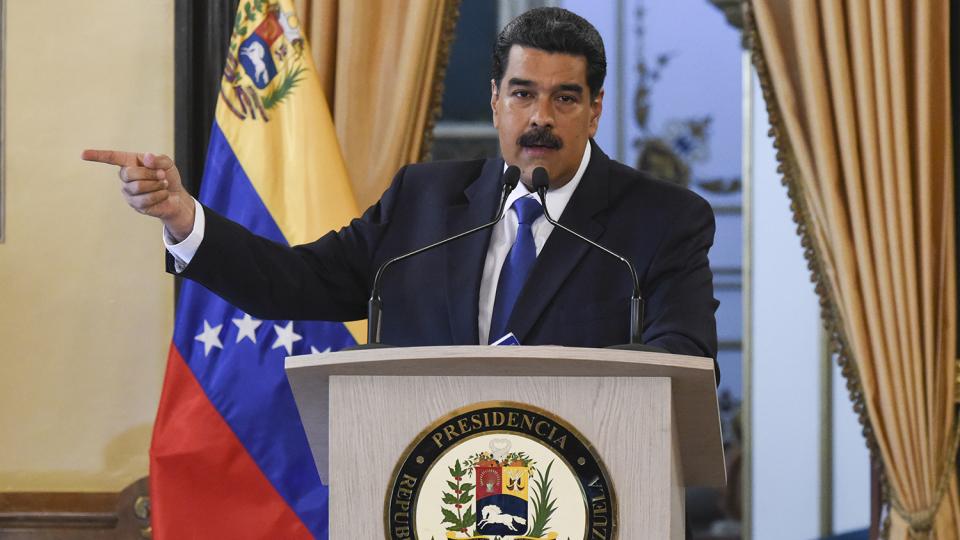

Excerpts from article first published in pagina12.org.ar on Sept. 19. Translation by John Catalinotto.
The Venezuelan government and a sector of its opposition signed a five-point agreement and established the National Dialogue Table on Sept. 16. The event modified the possible outcomes of the conflict. This happened while the negotiations mediated by Norway had been frozen. The general reaction to the broadcast scenes of the signing was that of surprise. This development had been unforeseen in the previously expected scenario in this conflict.
In the last few hours [of discussions], the first step forward was made within the framework of the pact. Edgar Zambrano, the deputy and vice president of the National Assembly and a member of the [opposition] Acción Democrática party, was released from prison. He had been arrested for participating in the abortive military coup on April 30. Zambrano must appear before a judge every 30 days.
The [Venezuelan] government was united in taking this action. As usual in these scenarios, Chavismo showed no internal differences in what it presented as a central achievement in the midst of an escalation [against President Nicolás Maduro] on several fronts – mainly in diplomacy and on the Colombian border.
Four political formations ratified and defended the agreement before the cameras: the [anti-Maduro groupings] MAS, Cambiemos, Soluciones para Venezuela and Avanzada Progresista. The opposition forces that are considered the majority, such as Voluntad Popular, were also joined by Javier Bertucchi, a former presidential candidate. The [opposition] groups Primero Justicia, Acción Democrática and Un Nuevo Tiempo rejected the agreement the others signed.
Juan Guaidó, president of the National Assembly, gave a statement at the same time as the televised signing of the agreement. There he ended the dialogue session initiated and mediated by Norway, first in Oslo, then in Barbados. Guaidó blamed the [Venezuelan] government for the impossibility of reaching an agreement and minimized the [role of the] opposition signatories, ruling out that this could be a possible solution.
The five points of the agreement – still to be developed – were: reincorporation of Chavista deputies to the National Assembly [this body was declared in contempt by the Supreme Court]; and formation of a new National Electoral Council (CNE), which would work with the justice system to address the situation of imprisoned politicians in order to release some of them in permissible cases. Also, rejection of U.S. economic sanctions; defense of Guyana Esequiba (territory in international dispute); and implementation of an oil-for-food exchange program.
Agreement rejects blockade
Therefore, the installation of the National Dialogue Table gives a glimpse of the possibility of an exit from the current crisis through an election. The central question would be the renewal of the CNE [the body that organizes the elections], a demand the opposition always puts on the table. At the same time, the agreement supports the attempt to avoid the clash of the two sides vying for state power, shown by the legislature’s situation and by the joint rejection of the international blockade that impedes economic recovery and normalization.
The negotiated points show a difference with the approach taken by opposition sectors which were absent from the talks. These sectors have defended the need for continued U.S. sanctions aimed at forcing the government to negotiate from an unfavorable position. They have also opposed any resolution that omits the departure of Nicolás Maduro as its starting point – before even holding presidential elections in which, they insist, Maduro could not participate.
Those positions are not homogeneous among the opposition groupings. Political forces such as Acción Democrática have shown that they are in favor of a possible electoral scenario, even though they are not signers of the new agreement. Other opposition forces have maintained that no exit from the crisis through the ballot box is feasible and the conflict must be resolved by force.
In addition to making progress on the announced points, the signed agreement seemingly aims to attract those sectors that oppose a violent exit requiring foreign intervention. Those sectors could agree on an intermediate position.
The issue of a peaceful, national resolution of the conflict was underlined in the agreement and in subsequent statements. This is a position within a scenario marked by three recent events that indicate the advance of groups that seek to employ violence to turn the correlation of forces in their favor.
The first event was the [Venezuelan] government’s denunciation of the threat of a false-flag action prepared from Colombia to provoke an accelerated escalation of confrontations. The second was the activation [in a meeting of the Organization of American States] of the Inter-American Treaty of Reciprocal Assistance (TIAR). This will be debated among the foreign ministers of the signatory countries during the United Nations General Assembly sessions [the last week of September]. The third was the new confirmation of Guaidó’s links with sectors of Colombian paramilitaries through photographs and testimonies.
Within this framework, the response of the United States was twofold. First, the Treasury Department announced new sanctions against 16 companies linked to Venezuela. Second, the State Department issued a statement accusing the Venezuelan government of being responsible for the failure of the talks, affirmed that it will not remove the blockade until Maduro leaves the presidency, and underlined the invocation of TIAR to “facilitate more collective actions.”
With its new scenario, the government has initiated a step in agreement with some opposition sectors, which were immediately called traitors by the other right-wing forces.
As part of Workers World newspaper’s coverage marking the 50th anniversary of the liberation of…
From the PFLP Central Media Office The following statement from the Popular Front for the…
Newark, New Jersey Over 250 people, representing over 250 New Jersey endorsing community groups, attended…
Special to Workers World The following is a press release issued on April 24, 2025,…
dear Larry Krasner, we heard you sued Elon Musk over his corrupt million election giveaways…
Unions join forces against harassment and deportation of members When 200 immigrant workers – from…